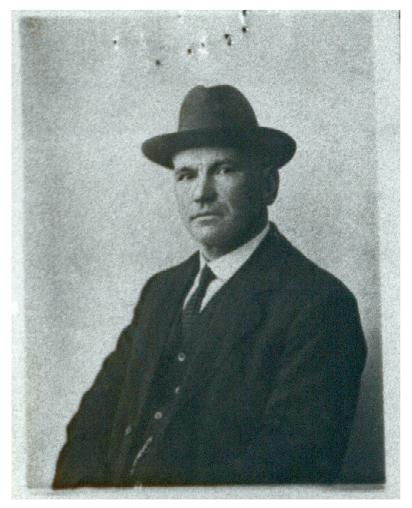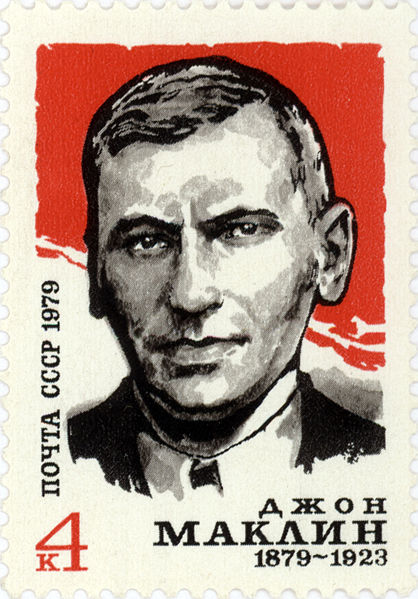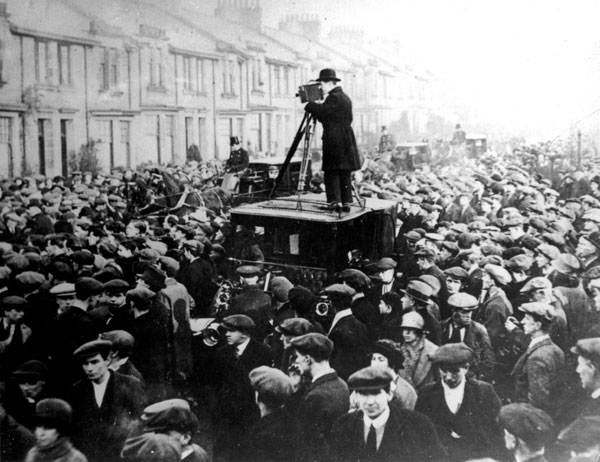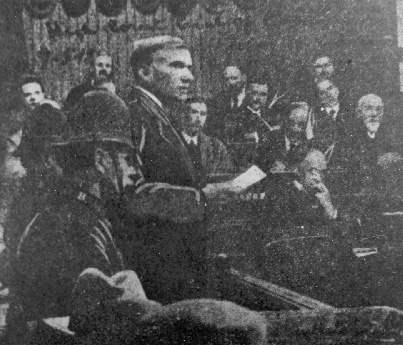Member Login
Free Search
Enter First Name, Last Name or Full Name and click Search,or click on the Advanced Search link for more options
Famous Scots - John Maclean M.a
Pages




Maclean was born in Pollokshaws, then on the outskirts of Glasgow, Scotland, to parents of Highland origin; his father Daniel (1845-1888) hailing from the Isle of Mull and his mother Ann (1846-1914) from Corpach.[4] Raised in a Calvinist household, Maclean trained as a schoolteacher under the auspices of the Free Church and then attended part-time classes at the University of Glasgow, graduating with a Master of Arts degree in 1904.
(Maclean often used the letters M.A. after his name when being published). [edit] Political developmentMaclean first came to politics through the Pollokshaws Progressive Union and Robert Blatchford's Merrie England. He became convinced that the living standards of the working-classes could only be improved by social revolution and it was as a Marxist that he joined the Social Democratic Federation (SDF), and remained in the organisation as it formed the British Socialist Party. Maclean was also an active member of the Co-operative movement and it was his prominent role that led the Renfrewshire Co-operative Societies to pressurise local school boards to provide facilities for adult classes in economics.[5] [edit] Marxist educatorBy the time of World War I his socialism was of a revolutionary nature, although he worked with others on the left who were more reformist in outlook, such as his friend James Maxton. He heavily opposed the war, as he felt it was a war of imperialism which divided workers from one another, as he explained in his letter to Forward (transcript).[6] His politics made him well known to the authorities of the day, and on the 27th of October, 1915 he was arrested under the Defence of the Realm Act[7] and Govan School Board sacked him from his teaching post at Lorne Street School.[8] As a consequence he became a full-time Marxist lecturer and organiser, educating other Glaswegian workers in Marxist theory. He would later found the Scottish Labour College. During World War I he was active in anti-war circles and was imprisoned for his efforts in 1916, but was released in 1917 after demonstrations following the February Revolution in Russia. [edit] Relationship with Russia John Maclean on Soviet postage stampIn January 1918 Maclean was elected to the chair of the Third All-Russian Congress of Soviets and a month later appointed Bolshevik consul in Scotland.[9] He established a Consulate at 12 Portland Street in Glasgow but was refused recognition by the British Government.[10] As a revolutionary enemy of what he saw as an imperialist war, Maclean was fiercely opposed to the stance adopted by the leadership of the BSP around H. M. Hyndman. However he was not to be a part of the new leadership which replaced Hyndman in 1916. [edit] Trial and imprisonment for sedition (1918)On 15 April 1918, Maclean was arrested for sedition[11]. He was refused bail and his trial fixed for 9 May in Edinburgh. He conducted his own defence in a defiant manner, refusing to plead and when asked if he objected to any of the jurors replying, "I object to the whole lot of them." The prosecution case was based on the testimony of witnesses who had attended his meetings, who quoted extracts from his speeches using notes they had written up from memory after the meeting. Maclean objected to his words being taken out of context, saying. "The main parts of my speech, in which my themes are developed are omitted. I want to expose the trickery of the British government and their police and their lawyers."[12] Maclean addressed the jury in an "impassioned speech" lasting 75 minutes, which he used to attack the capitalist system: "I had a lecture, the principal heading of which was ?Thou shalt not steal; thou shalt not kill", and I pointed out that as a consequence of the robbery that goes on in all civilised countries today, our respective countries have had to keep armies, and that inevitably our armies must clash together. On that and on other grounds, I consider capitalism the most infamous, bloody and evil system that mankind has ever witnessed. My language is regarded as extravagant language, but the events of the past four years have proved my contention.... "I wish no harm to any human being, but I, as one man, am going to exercise my freedom of speech. No human being on the face of the earth, no government is going to take from me my right to speak, my right to protest against wrong, my right to do everything that is for the benefit of mankind. I am not here, then, as the accused; I am here as the accuser of capitalism dripping with blood from head to foot."[13] He was sentenced to five years penal servitude, and imprisoned in Peterhead prison near Aberdeen. However, a militant campaign was launched for his release: "The call 'Release John Maclean was never silent. Every week the socialist papers kept up the barrage and reminded their readers that in Germany Karl Liebknecht was already free, while in 'democratic' Britain John Maclean was lying in a prison cell being forcibly fed twice a day by an India rubber tube forced down his gullet or up his nose. 'Is the Scottish Office' asked Forward. 'to be stained with a crime in some respects even more horrible and revolting, more callous and cruel, than that which the Governors of Ireland perpetrated on the shattered body of James Connolly?' "[14] Following the armistice on 11 November, he was released on 3 December 1918, returning to Glasgow to a tumultuous welcome. [edit] Formation of the Communist PartyAs the BSP was the main constituent organisation which merged into the newly formed Communist Party of Great Britain, Maclean was alienated from the new party despite his support for the Communist International. He developed a belief that workers in Scotland could develop in a revolutionary direction more swiftly than their comrades in England and Wales, and attempted to found a Scottish Communist Party. This grouping renamed itself the Communist Labour Party and dropped Maclean's distinctive positions, so he left in disgust. He attempted to found a new Scottish Communist Party, without success. It seems that he may have become a member of the Socialist Labour Party at this time. It was around this time that Maclean formed the Scottish Workers Republican Party which combined Communism with a belief in Scottish independence. Maclean's call for a Communist Republic of Scotland was based on the belief that traditional Scottish society was structured along the lines of "Celtic communism". He argued that "the communism of the clans must be re-established on a modern basis" and raised the slogan "back to communism and forward to communism".[15] John Maclean's casket being removed from his Pollokshaws home.[edit] Death and legacyHis stay in Peterhead Prison in 1918 caused a considerable deterioration in his health, being force fed through hunger strikes.[16] Milton quotes a letter that Agnes, his wife, wrote to E. C. Fairchild (a leading member of the British Socialist Party): Well, John has been on hunger strike since July. He resisted the forcible feeding for a good while, but submitted to the inevitable. Now he is being fed by a stomach tube twice daily. He has aged very much and has the look of a man who is going through torture... Seemingly anything is law in regard to John. I hope you will make the atrocity public. We must get him out of their clutches. It is nothing but slow murder...[17] When he died in 1923, aged just 44, his reputation was such that several thousand people lined the streets of Glasgow to see his funeral procession pass. He left a legacy that has subsequently been claimed by both the Scottish Nationalist and Labour movements, making him rare in this respect amongst Scotland's historical figures. The modern Scottish Socialist Party lay claim to Maclean's political legacy, particularly the Scottish Republican Socialist Movement previously a faction (or "platform") within the SSP.
Headstone Photograph

Further Information
Title: M.A
Firstname: JOHN
LastName: MACLEAN
Date of Death: 30th Nov 1923
Age at Death: 44
Cemetery: Eastwood new
Thornliebank Road
Town: Glasgow
Region: Glasgow and Clyde Valley
Country: Scotland
Please Note, the marker on this map indicates the Cemetery location, not the location of a particular grave.
<< Back



